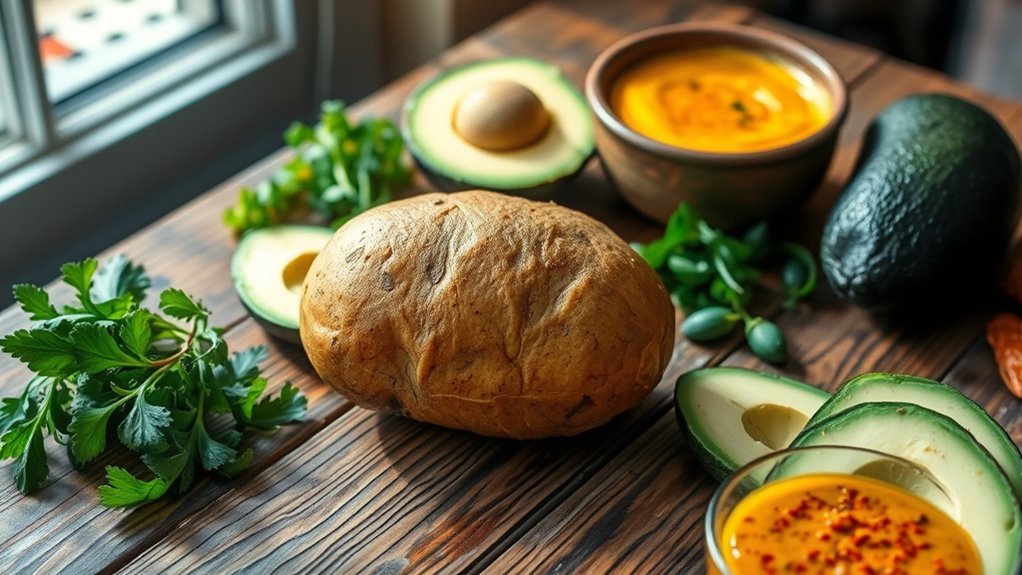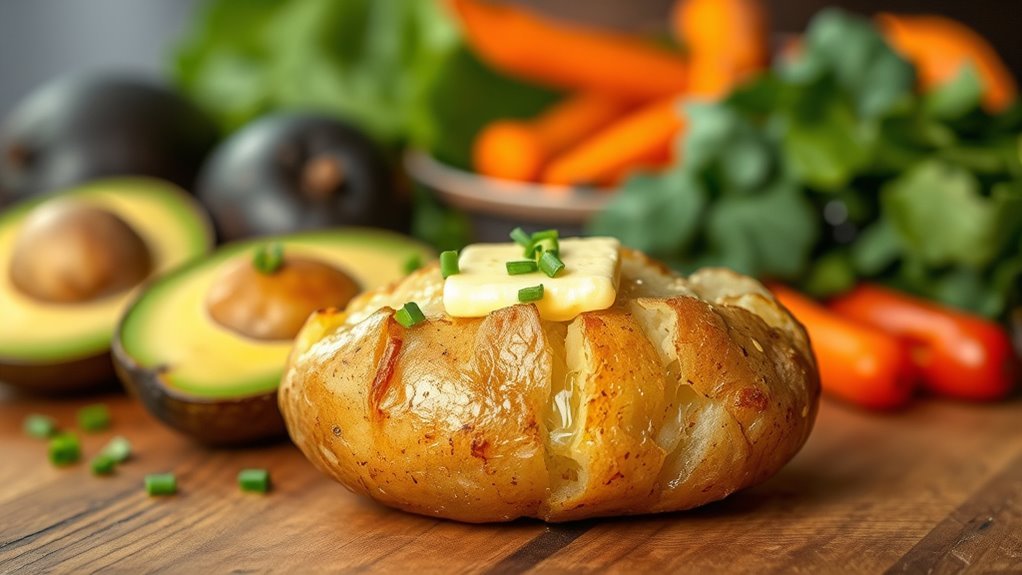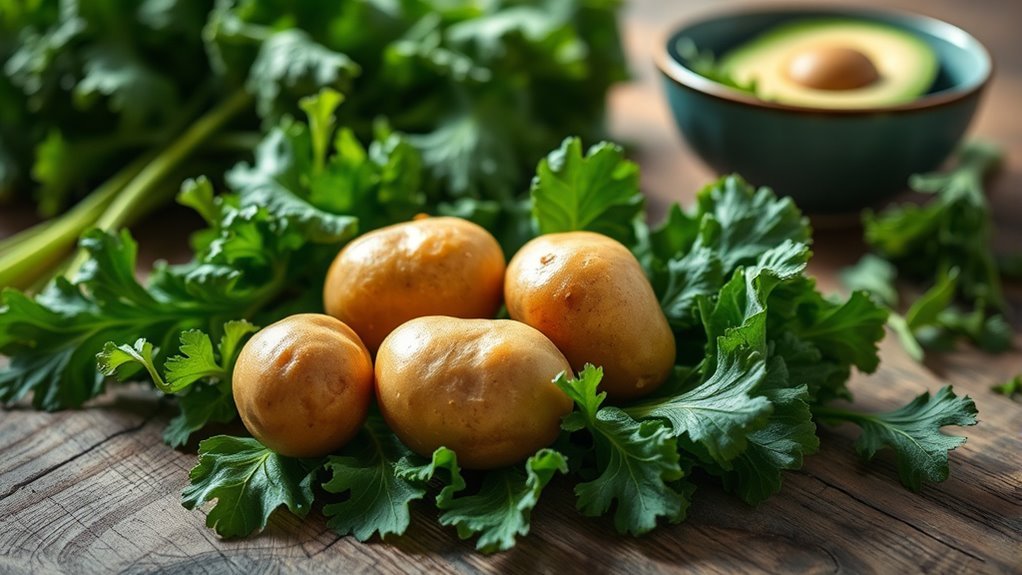You can’t have potatoes on the keto diet without caution. Their high carbohydrate content can disrupt ketosis, making it challenging to maintain fat-burning. For instance, a medium potato has around 37 grams of carbs, which exceeds your daily limit. While potatoes offer nutritional benefits like vitamins and minerals, they can spike your blood sugar levels and contribute to weight gain. There are tasty, low-carb alternatives like cauliflower rice and zucchini noodles that fit better into a keto lifestyle. Discover more options to adapt your meals effectively.
Understanding the Keto Diet and Carbohydrate Limits

When you’re diving into the keto diet, it’s essential to understand its foundation, particularly concerning carbohydrate limits. This diet focuses on achieving a specific macronutrient balance, usually around 5-10% of your daily caloric intake from carbs. By limiting carbs, your body shifts into ketosis, where it burns fat for fuel instead of glucose. However, not all carbs are created equal; incorporating dietary fiber is vital for digestive health. Fiber-rich foods can help you feel full and satisfied while keeping you in ketosis. Remember, it’s not just about cutting carbs but also about making smart choices that support your overall well-being. Embracing this balance allows you the freedom to enjoy a variety of low-carb options within your keto journey.
The Nutritional Profile of Potatoes

When considering potatoes in your diet, it’s essential to understand their carbohydrate content and the vitamins and minerals they provide. Potatoes are primarily composed of carbohydrates, which can impact your keto goals, but they also offer valuable nutrients like vitamin C and potassium. Balancing these factors will help you make informed choices about including potatoes in your meals.
Carbohydrate Content Overview
Although potatoes are a staple in many diets, their carbohydrate content can pose a challenge for those following a ketogenic lifestyle. Generally, potatoes are high in carbs, with an average medium potato containing around 37 grams of carbohydrates. This makes them a significant carbohydrate source, which can disrupt ketosis. Different potato varieties, like russets, reds, and fingerlings, vary slightly in carb content, but they all remain substantial. Even sweet potatoes, often considered healthier, still pack a hefty carb punch. If you’re committed to a keto diet, it’s crucial to be mindful of these numbers. Instead of potatoes, consider low-carb alternatives, like cauliflower or zucchini, to maintain your carbohydrate goals while enjoying flavorful meals.
Vitamins and Minerals Present
Potatoes, often celebrated for their versatility, are packed with essential vitamins and minerals that contribute to overall health. They’re particularly high in potassium content, which supports heart health and muscle function. A medium potato can provide nearly 20% of your daily potassium needs. Moreover, potatoes are an excellent source of vitamin C, crucial for immune function and skin health. The magnesium levels in potatoes also play a role in muscle and nerve function, promoting relaxation and reducing stress. Additionally, the fiber benefits from the skin of potatoes can aid digestion and improve gut health. While they’re not typically keto-friendly, understanding their nutritional profile helps you make informed choices about your diet.
How Potatoes Affect Ketosis

While many people turn to the keto diet for weight loss and improved health, understanding how certain foods, like potatoes, can impact ketosis is crucial. Potatoes, regardless of their variety or cooking methods, are high in carbohydrates, which can quickly kick you out of ketosis if consumed in excess. Here’s a quick overview:
| Potato Variety | Carbs per 100g | Cooking Method |
|---|---|---|
| Russet | 17g | Baked |
| Red Potatoes | 15g | Boiled |
| Sweet Potatoes | 20g | Mashed |
| Fingerling | 16g | Roasted |
These carb counts highlight the importance of moderation. If you’re committed to staying in ketosis, you’ll need to be selective about your potato choices and portion sizes.
Health Benefits and Drawbacks of Potatoes
When considering the health benefits and drawbacks of potatoes, it is essential to recognize both their nutritional value and potential downsides. Potatoes are rich in vitamins, minerals, and dietary fiber, which can aid digestion and promote overall health. They also provide a good source of carbohydrates, offering energy for your daily activities. However, the potential drawbacks include their high glycemic index, which can spike blood sugar levels, especially for those managing diabetes or following a ketogenic diet. Additionally, many people experience weight gain when consuming potatoes due to their calorie density. Balancing these factors allows you to make informed choices about including potatoes in your diet while being aware of their impact on your health and lifestyle.
Keto-Friendly Alternatives to Potatoes
If you’re looking for keto-friendly alternatives to potatoes, cauliflower rice and zucchini noodles are excellent options. Cauliflower rice provides a similar texture and can absorb flavors well, making it a versatile base for many dishes. Meanwhile, zucchini noodles offer a low-carb, satisfying substitute for traditional pasta, allowing you to enjoy your favorite meals without sacrificing your keto goals.
Cauliflower Rice Substitute
Cauliflower rice has emerged as a popular substitute for traditional grains and starchy vegetables, especially among those following a keto diet. This versatile ingredient offers numerous cauliflower rice benefits, such as being low in carbs and high in fiber, making it a great choice for weight management. You can easily incorporate it into various meals, from stir-fries to casseroles. Here are some exciting cauliflower rice recipes you might enjoy:
| Recipe Name | Main Ingredients | Cooking Method |
|---|---|---|
| Cauliflower Fried Rice | Cauliflower, peas, eggs | Stir-fry |
| Cauliflower Risotto | Cauliflower, broth, cheese | Simmer |
| Cauliflower Tacos | Cauliflower, spices, shells | Bake/assemble |
| Cauliflower Sushi | Cauliflower, nori, veggies | Roll |
| Cauliflower Pizza | Cauliflower, cheese, sauce | Bake |
Embrace the freedom of creativity in your keto meals!
Zucchini Noodle Options
Zucchini noodles, or “zoodles,” have become a favored alternative for those on a keto diet looking to replace traditional pasta or potatoes. Made from spiralized zucchini, these noodles are low in carbohydrates and calories, making them an ideal choice for maintaining ketosis. They’re versatile, pairing well with various sauces, proteins, and veggies, allowing you to explore different flavors without sacrificing your dietary goals. You can sauté, bake, or even serve them raw in salads for a rejuvenating twist. Plus, zucchini is rich in vitamins and minerals, providing added nutritional benefits. By incorporating zucchini noodles into your meals, you can enjoy a satisfying dish that aligns with your keto lifestyle while still feeling free to indulge in delicious flavors.
Incorporating Potatoes Mindfully in a Keto Diet
While potatoes are often considered a taboo food on the keto diet due to their high carbohydrate content, you can still incorporate them mindfully with careful planning and moderation. The key is mindful consumption and portion control. Instead of indulging in large servings, consider smaller portions, perhaps mixing potatoes with low-carb vegetables to balance your meal. You might also try using alternative cooking methods, like steaming or baking, to retain nutrients without adding unnecessary fats. Remember, your body’s response to carbohydrates can vary, so monitor how you feel after including potatoes in your diet. By being strategic and intentional about your choices, you can enjoy the occasional potato while still adhering to your keto lifestyle.
Frequently Asked Questions about Potatoes on the Keto Diet
1. Can I eat potatoes on a keto diet?
Potatoes are generally high in carbohydrates, which makes them unsuitable for a strict ketogenic diet that typically limits daily carb intake to around 20-50 grams. A medium-sized potato can contain upwards of 30 grams of carbs, which can easily exceed your daily limit. Therefore, it’s advisable to avoid potatoes if you’re aiming to maintain ketosis.
2. Are there any potato alternatives that are keto-friendly?
Yes, there are several alternatives to potatoes that fit well within a ketogenic diet. Options like cauliflower, turnips, and zucchini can be great substitutes. For instance, cauliflower can be mashed or riced to mimic the texture of potatoes while being much lower in carbs. Additionally, these vegetables can be prepared in similar ways to traditional potato dishes.
3. What happens if I eat potatoes while on a keto diet?
If you consume potatoes while on a keto diet, it could potentially kick you out of ketosis due to their high carb content. This means your body may stop burning fat for fuel and revert back to using glucose from carbohydrates. You may experience symptoms like fatigue, cravings, and brain fog as your body readjusts to a higher carb intake.
4. Can I include small amounts of potatoes in my diet and still stay in ketosis?
While some individuals may be able to consume small amounts of potatoes and remain in ketosis, this varies greatly from person to person based on factors such as activity level, overall carb tolerance, and metabolic health. If you choose to include potatoes, it’s crucial to monitor your overall carb intake and how your body responds. Testing your ketone levels can help you determine if you can incorporate small amounts without disrupting ketosis.
5. What are some tips for managing cravings for potatoes on a keto diet?
Managing cravings for potatoes on a keto diet can be challenging, but there are several strategies that can help. First, focus on hydrating adequately, as sometimes cravings can be mistaken for hunger. Incorporating high-fat foods like avocados and nuts can help satisfy your appetite. Additionally, try using keto-friendly substitutes like cauliflower or turnip recipes to satisfy your cravings. Lastly, keeping your meals rich in fiber and protein can help keep you full, reducing the urge to reach for potatoes.
References
- https://www.healthline.com/nutrition/are-potatoes-keto-friendly
- https://www.dietdoctor.com/low-carb/potatoes
- https://www.ncbi.nlm.nih.gov/pmc/articles/PMC6466712/
- https://www.cdc.gov/healthyweight/healthy_eating/index.html
- https://www.mayoclinic.org/healthy-lifestyle/nutrition-and-healthy-eating/in-depth/keto-diet/art-20460015
- https://www.webmd.com/diet/obesity/ss/slideshow-keto-diet
- https://www.bbcgoodfood.com/howto/guide/what-keto-diet
- https://www.nutrition.gov/what-keto-diet


